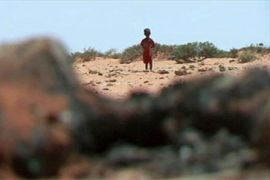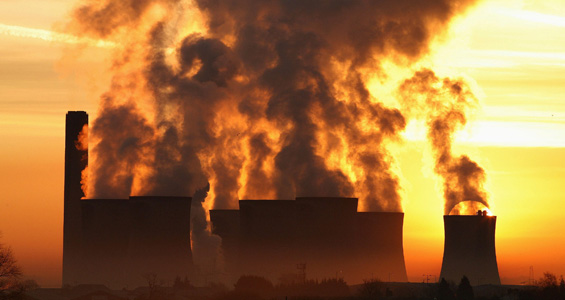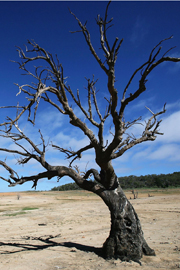‘Climate change a conflict risk’
But expert says the link between the two may present an opportunity as well as a threat.

 |
| Climate change exacerbates existing conflict threats, experts say [GALLO/GETTY] |
During the past two years, awareness has been growing that one of the consequences of climate change is an increased risk of violent conflict in developing countries.
But what is the scale of the problem, why does it exist and what can be done?
Keep reading
list of 4 itemsAfter the Hurricane
World’s coral reefs face global bleaching crisis
Why is Germany maintaining economic ties with China?
A study by International Alert, a London-based international peacebuilding organisation, in 2007 found that 46 countries with a combined population of 2.7 billion people are at risk of armed conflict related to the effects of climate change. A further 56 countries – with a combined population of 1.2 billion – have a severe risk of political instability.
So it is a big problem – but also a subtle one. It would be misleading to argue that climate change alone causes wars. Armed conflicts never start because of a single cause and, in any case, climate change is not the only thing happening in the world.
The conflict problem comes about because climate change interacts with a number of other things that are wrong in a country’s social, economic and political landscape – poverty, arbitrary and corrupt state power, inequality, legacies of war and colonialism, the malign influence of outside power and so on.
| in depth | |||||||||||
|
So climate change is a stress multiplier. We see how this works by looking at one of the main natural consequences of climate change – fluctuations in water supply.
In some places this means drought; in others there is an excess because glaciers are melting and in others still the problem is that the rainy season’s timing and duration are changing.
What these different effects have in common is that they damage agriculture. This reduces food security and puts livelihoods at risk.
These slow-onset changes creep up on a community.
A different kind of risk lies in the increasing frequency and intensity of extreme weather events.
As the typhoons that have hit Manila this month show, sudden shocks put huge pressure on communities and societies in both rural and urban settings.
Governance crucial
A key factor deciding whether all this will lead to conflict, and, if so, whether that conflict turns violent, lies in the nature of governance.
If the government’s response to either slow or sudden change is under-resourced, ill-prepared and inefficient, especially if funds go corruptly astray, this will generate resentment that could get the conflict escalator moving.
Slow-onset changes, such as drought, deprive people of the basic resources of life. As that happens, ordinary problems become harder to solve and conflicts get sharper and harder to manage.
Dealing with them, whether through force or compromise, starts to require more resources at exactly the moment when less are available.
Climate change thus increases the risk of conflict, but many of the conflicts that arise will have nothing obvious to do with climate change – they will be about jobs and food prices, or political freedoms and the right to be heard.
 |
| Some countries will be affected by drought [GALLO/GETTY] |
Thinking about these risks highlights the importance of adaptation to climate change, especially of peaceful adaptation in fragile states. This issue is rising up the international political agenda.
So far, the cost has been the prime focus of discussion and it is huge. The UN puts it in the range of $49bn to $171bn per year by 2030. But a study by two London institutes estimates that the likely cost of adaptation will eventually reach about $330bn to $380bn a year.
Colossal though these sums are, it is important not to get fixated by their scale. They only make sense if they are understood as a myriad of adaptation actions in a very wide range of settings. Adaptation will be local or it will not happen at all.
For communities to adapt so that they can survive climate change, they need to receive information whose source and content they trust, so that they know and understand what tasks they must undertake. The trouble is that weak institutions, autocratic governments and fragile states do not generate that trust.
So the task of responding to climate change is not simply about piling up the sandbags. Just as reducing carbon emissions in rich countries requires economic change, so adapting in developing countries to the consequences of climate change requires political change.
Grounds for optimism
It is a complex challenge but here, paradoxically perhaps, is where grounds for optimism lie.
Consider communities and societies that are divided by conflict issues. For them, climate change is a threat that does not come from any of the conflict parties. It is a superordinate threat against which those divided by conflict can unite.
And local adaptation is made up of tasks around which it is necessary, and at the same time possible, to cooperate.
Looking at this more broadly, if adaptation works, the benefits could be very wide.
In too many countries, a narrow elite holds power. Development means broadening the basis of power into a social contract between elites and citizens.
But why do elites do this – why do they agree to share power? They do it when there is an incentive – profit or survival, for example. The externally generated challenge of climate change could offer precisely such an incentive for having broader social participation in the national institutions of power.
If developing countries can successfully meet the challenge of adapting to climate change, they will be able to start developing properly. Their success against climate change will make them better able to resolve conflicts peacefully and vice versa.
What rich countries need to do is ensure that there is adequate international financial support for national enablement of local adaptation. Sorting this out is a process that has only just begun.
Dan Smith is the secretary general of International Alert, a London-based international peacebuilding organisation. He co-authored the report A Climate of Conflict in 2007.
The opinions expressed in this article are the author’s own and do not necessarily reflect Al Jazeera’s editorial policy.
